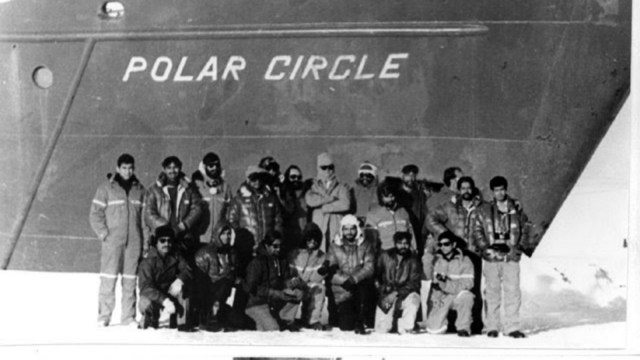‘We couldn’t tell our wives’: Remembering Operation Gangotri, the top-secret expedition that first took India to Antarctica
The historic expedition, code-named Operation Gangotri, was kept under wraps from the public, since the outcome was uncertain.
 First Indian expedition team members after setting foot in Antarctica
First Indian expedition team members after setting foot in Antarctica“A top-secret operation, like a James Bond movie.” That’s how men who led India’s first foray to Antarctica more than four decades ago described the operation, as they gathered to mark ‘Antarctica Day’ on Friday.
Celebrated on December 1 each year, Antarctica Day marks the signing of the Antarctic Treaty in 1959. But it wasn’t until 1981 that India decided to send its first scientific expedition to the icy continent. Marine biologist Dr S Z Qasim headed the 21-member team, which travelled on a chartered Norwegian vessel called the Polar Circle.
The historic expedition, code-named Operation Gangotri, was kept under wraps from the public, since the outcome was uncertain.
 A member of the team with a penguin
A member of the team with a penguin
“The operation was very secretive… A boat was chartered from Norway, but there were back channel talks with the country not to tell. There was a lot of diplomacy involved,” Dr Rahul Mohan, project director, National Centre for Polar and Ocean Research (NCPOR) in Goa.
On January 9, 1982, the group set foot on Antarctica and hoisted the Indian flag.
Speaking at NCPOR in Goa on Friday, Dr Amitava Sengupta, member of the first expedition, said, “It was one of those top secret operations, organised in record time. The entire operation, starting from conception to us finally sailing off from Goa on December 6, was accomplished in just over four months. We all (scientists) were in our late 20s and… our initial meetings were behind closed doors. People like… the cabinet secretary, defence secretary and the chief of naval staff… they were addressing us and we were discussing strategy… and we were not allowed to tell any of this outside. We couldn’t tell our wives. We felt like we were in a James Bond movie. It was very exciting.”
“I had till then never seen a ship, let alone being on one. I had never seen snow. We had to be acclimatised for the sea… So, we were packed off to Srinagar, Gulmarg… and then sent on one of the Indian Navy frigates… and taken around the Bay of Bengal for seven days and so on… There were six-seven of us scientists who had to be trained, and because this was top secret, the trainers were not allowed to know what we were going to be trained for… So, he (the ship’s captain) gave us all kinds of training like shooting a pistol… they thought we were being trained for some secret offensive operation,” said Sengupta. “Ten days after we set sail, the news broke in a magazine.”
“When we came back from Antarctica, it was as if we had come back from the moon or something,” he said. “Someone told me, ‘you must know swimming’. I said I am from Delhi, I don’t know swimming and it wouldn’t matter anyway – if one goes into that water, one would die of a heart attack.”
Another member recalled: “You see, the biggest problem in Antarctica is water. There is so much of it, but it’s the wrong form – it’s solid… One person’s duty was to melt water. We ate dehydrated food that we had carried with us.”
M C Pathak, a member of the first expedition, said, “When we landed, we put up our tents… At midnight, when we were asleep, I saw the satellite position. We were drifting out… We contacted the ship and we were rescued by a helicopter.”
Members of the third Indian scientific expedition to Antarctica were also felicitated at the event, to commemorate the 40th anniversary of commissioning of Dakshin Gangotri – India’s first research station in Antarctica. The expedition was launched in 1983 with 83 members under the leadership of Dr Harsh K Gupta.
One of the members of the expedition said they were given only a few minutes to talk to family members on a satellite phone. “On one occasion, one of the crew members had given the number of his village post office, since there was no phone at his house. The operator, instead of connecting him with his family, would enquire about the officer’s matrimonial details to set up a match,” said Lt Gen Abhay Parnaik, who was part of the third expedition.
Recalling a telephonic conversation with then Prime Minister Indira Gandhi, after a helicopter crash occurred during the expedition leaving five people injured, Dr Gupta said, “I picked up the phone… first question (by the PM) was, ‘Harsh, what happened?’ Second question, ‘Are those five people safe’?”
After he explained the circumstances, he said, “Then she (Gandhi) asked me, ‘Can you still do it?’ I replied, ‘If I don’t do it, I don’t come back’. There was a long pause after that. And then I heard, ‘Go ahead and do it’.”
Dr Gupta said, “When I look back, I realise why that pause was there. She is the Prime Minister of the country. She is asking a young man to accomplish a task under a very adverse situation… So in case, something goes wrong with the expedition, everyone will question her.”








